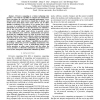Free Online Productivity Tools
i2Speak
i2Symbol
i2OCR
iTex2Img
iWeb2Print
iWeb2Shot
i2Type
iPdf2Split
iPdf2Merge
i2Bopomofo
i2Arabic
i2Style
i2Image
i2PDF
iLatex2Rtf
Sci2ools
138
click to vote
PERCOM
2005
ACM
2005
ACM
A Capability-Based Privacy-Preserving Scheme for Pervasive Computing Environments
Pervasive computing is a future technology that provides a user with the capability to compute and communicate from everywhere. In a pervasive computing environment, a user interacts with many smart devices around him to obtain some useful services from them. These smart devices can be either genuine or malicious. Users privacy is at a greater risk, as they are prone to revealing their location, identity and transactions information to such devices. On the other hand, user authentication is also very much required for authorization and service access control. This allows smart devices to provide services to only authorized users. However, authentication and privacy protection are conflicting issues. In order to protect users from invasion of privacy, they must be allowed to interact anonymously with other smart devices. Thus, authenticating and authorizing an anonymous user becomes a challenging task. In this paper, we propose a simple and efficient "capability-based privacypreser...
PERCOM 2005 | Pervasive Computing | Pervasive Computing Environments | Smart Devices | Wireless Networks |
Related Content
| Added | 24 Dec 2009 |
| Updated | 24 Dec 2009 |
| Type | Conference |
| Year | 2005 |
| Where | PERCOM |
| Authors | Divyan M. Konidala, Dang Nguyen Duc, Dongman Lee, Kwangjo Kim |
Comments (0)

